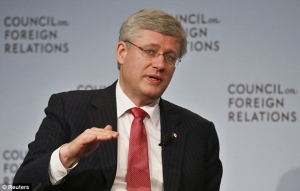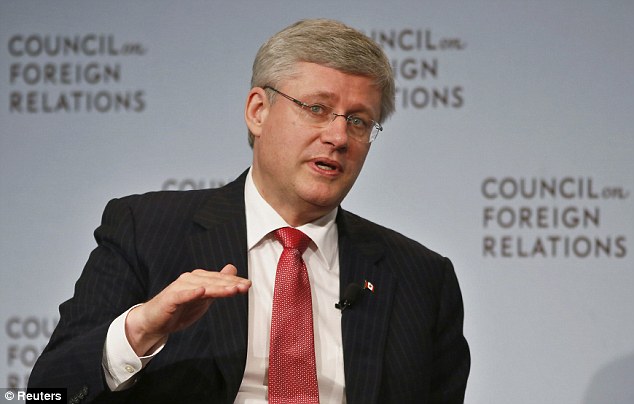Canada bans government meteorologists from talking about climate change
- Meteorologists with the Canadian government aren’t allowed to speak publicly about climate change
- A spokesperson said the policy is because meteorologists are not climate experts
- Other federal scientists must seek permission to speak to media
- The measures are part of Prime Minister Stephen Harper’s Communication Protocol
- Critics say Harper is trying to muzzle experts
- The federal Environment Canada agency says there has been an 80 per cent reduction in media coverage of climate change in Canada
- A study by the Professional Institute of the Public Service of Canada reports that 90 per cent of federal scientists feel they are not allowed to speak freely about their work
- Eighty-six per cent feel they would face censure for doing so – even if it was for the benefit of the public
‘Environment Canada scientists speak to their area of expertise. For example, our Weather Preparedness Meteorologists are experts in their field of severe weather and speak to this subject,’ government spokesperson Mark Johnson wrote in an email to journalist Mike De Souza.
‘Questions about climate change or long-term trends would be directed to a climatologist or other applicable authority.’
More…
Meteorologists are among the most oft-quoted government experts and according to Newsweek, half of all media inquiries received by Environment Canada are for them.
However, other federal scientists must seek official permission to speak to journalists and in some cases must have their responses approved by their superiors, as per Harper’s Communications Protocol.
As a result of the often lengthy process, there has been a huge drop in interview requests for government scientists from major media organizations, which are often working on same-day deadlines.
 According to a leaked Environment Canada document, the agency has noticed that ‘Media coverage of climate change science, our most high profile issue, has been reduced by over 80 per cent.’
According to a leaked Environment Canada document, the agency has noticed that ‘Media coverage of climate change science, our most high profile issue, has been reduced by over 80 per cent.’
Critics say the government is seeking to ‘muzzle’ scientists from speaking about climate change.
According to a study by the Professional Institute of the Public Service of Canada, many federal scientists feel they are unable to speak openly in their areas of expertise.
’90 per cent [fusion_builder_container hundred_percent=”yes” overflow=”visible”][fusion_builder_row][fusion_builder_column type=”1_1″ background_position=”left top” background_color=”” border_size=”” border_color=”” border_style=”solid” spacing=”yes” background_image=”” background_repeat=”no-repeat” padding=”” margin_top=”0px” margin_bottom=”0px” class=”” id=”” animation_type=”” animation_speed=”0.3″ animation_direction=”left” hide_on_mobile=”no” center_content=”no” min_height=”none”][of federal scientists] feel they are not allowed to speak freely to the media about the work they do and that, faced with a departmental decision that could harm public health, safety or the environment, nearly as many (86 per cent) would face censure or retaliation for doing so,’ reads the report.
Federal scientists are facing a climate of fear,’ says PIPSC president Gary Corbett, ‘a chill brought on by government policies that serve no one’s interests, least of all those of the Canadian public.
‘The safety of our food, air, water, of hundreds of consumer and industrial products, and our environment depends on the ability of federal scientists to provide complete, unbiased, timely and accurate information to Canadians. Current policies must change to ensure these objectives are met.’
According to Inside Climate News, environmental organizations say they have also come in for undue scrutiny from the government.
Seven organizations were subject to audits by the Canada Revenue Agency (CRA) this year, just before decisions relating to two tar sands pipelines, which would bring landlocked Alberta’s oil to market, were being made.
The audits are investigating whether the organizations have committed abuses which would result in them losing their non-profit status, which exempts them from paying taxes.
Canadian law states that no more than 10 per cent of a non-profit’s proceeds can be used for political advocacy.
If the CRA determines that they have surpassed their advocacy limit, many of the organizations may be forced to shutter.
‘It’s all very scary,’ Dr Chris Metcalfe, Director of the Institute for Watershed Science at Trent University told Vocativ.
‘It’s all about controlling the message. In my estimation the government doesn’t want the work of environmentalists running counter to their official policies.’
Harper’s administration doubled its pro-tar sands advertising budget between 2012 and 2013, reports Newsweek. Mining the controversial oil uses up a fifth as much energy as it produces and is extremely unpopular with environmentalists.
- Government¿s weather forecasters shouldn¿t discuss climate change, says Environment Canada
- Canada Bars Its Meteorologists From Mentioning Climate Change
- Harper Govt Makes Moves to Silence Canada’s Leading Environmental Groups
- Canada Cracks Down on Scientists Who Talk About Climate Change
- Most Federal Scientists Feel They Can¿t Speak Out, Even If Public Health and Safety at Risk, Says New Survey
- Climate-change scientists feel ‘muzzled’ by Ottawa: Documents
Read more: http://www.dailymail.co.uk/news/article-2646897/Canada-bans-government-meteorologists-talking-climate-change.html#ixzz33lllkrvw
Follow us: @MailOnline on Twitter | DailyMail on Facebook[/fusion_builder_column][/fusion_builder_row][/fusion_builder_container]









